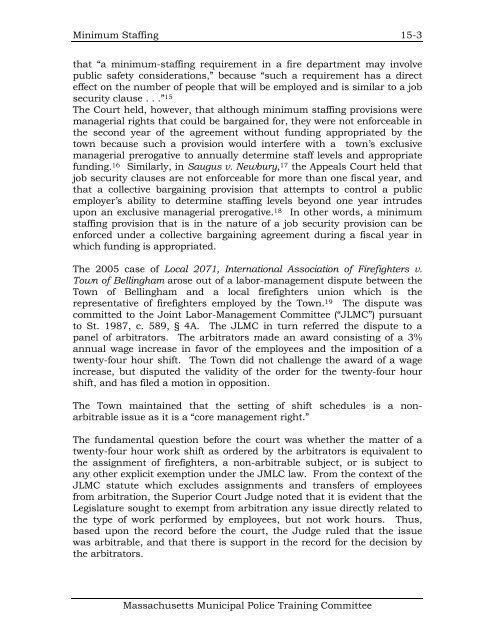Management Rights - AELE's Home Page
Management Rights - AELE's Home Page
Management Rights - AELE's Home Page
Create successful ePaper yourself
Turn your PDF publications into a flip-book with our unique Google optimized e-Paper software.
Minimum Staffing 15-3<br />
that “a minimum-staffing requirement in a fire department may involve<br />
public safety considerations,” because “such a requirement has a direct<br />
effect on the number of people that will be employed and is similar to a job<br />
security clause . .” 15<br />
The Court held, however, that although minimum staffing provisions were<br />
managerial rights that could be bargained for, they were not enforceable in<br />
the second year of the agreement without funding appropriated by the<br />
town because such a provision would interfere with a town’s exclusive<br />
managerial prerogative to annually determine staff levels and appropriate<br />
funding. 16 Similarly, in Saugus v. Newbury, 17 the Appeals Court held that<br />
job security clauses are not enforceable for more than one fiscal year, and<br />
that a collective bargaining provision that attempts to control a public<br />
employer’s ability to determine staffing levels beyond one year intrudes<br />
upon an exclusive managerial prerogative. 18 In other words, a minimum<br />
staffing provision that is in the nature of a job security provision can be<br />
enforced under a collective bargaining agreement during a fiscal year in<br />
which funding is appropriated.<br />
The 2005 case of Local 2071, International Association of Firefighters v.<br />
Town of Bellingham arose out of a labor-management dispute between the<br />
Town of Bellingham and a local firefighters union which is the<br />
representative of firefighters employed by the Town. 19 The dispute was<br />
committed to the Joint Labor-<strong>Management</strong> Commitee (“JLMC”) pursuant<br />
to St. 1987, c. 589, § 4A. The JLMC in turn referred the dispute to a<br />
panel of arbitrators. The arbitrators made an award consisting of a 3%<br />
annual wage increase in favor of the employees and the imposition of a<br />
twenty-four hour shift. The Town did not challenge the award of a wage<br />
increase, but disputed the validity of the order for the twenty-four hour<br />
shift, and has filed a motion in opposition.<br />
The Town maintained that the setting of shift schedules is a nonarbitrable<br />
issue as it is a “core management right.”<br />
The fundamental question before the court was whether the matter of a<br />
twenty-four hour work shift as ordered by the arbitrators is equivalent to<br />
the assignment of firefighters, a non-arbitrable subject, or is subject to<br />
any other explicit exemption under the JMLC law. From the context of the<br />
JLMC statute which excludes assignments and transfers of employees<br />
from arbitration, the Superior Court Judge noted that it is evident that the<br />
Legislature sought to exempt from arbitration any issue directly related to<br />
the type of work performed by employees, but not work hours. Thus,<br />
based upon the record before the court, the Judge ruled that the issue<br />
was arbitrable, and that there is support in the record for the decision by<br />
the arbitrators.<br />
Massachusetts Municipal Police Training Committee
















